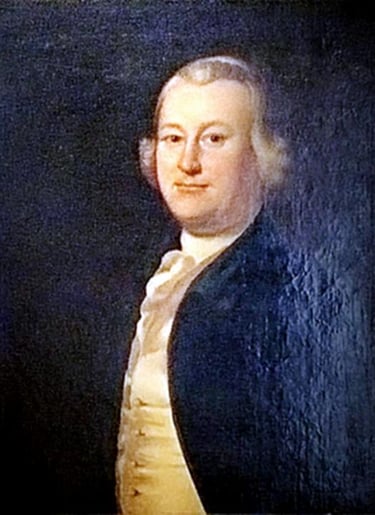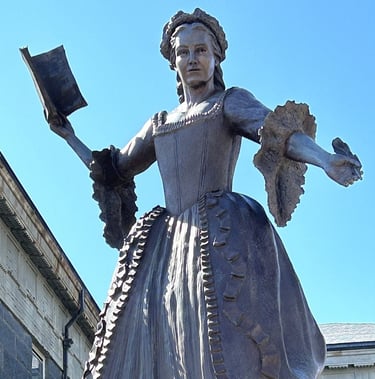Underappreciated Heroes of the Revolution #1 - "The Brother/Sister Orators"
I thought to mark the week of Ken Burns new PBS series on the "American Revolution", I would do a series of posts on lesser-known heroes of the Revolutionary War period. So I'm starting with a brother and sister duo becoming a little better known in the past decade - James Otis and Mercy Otis Warren.
Jay LeBlanc
11/17/20254 min read
This is the first of a series of posts on underappreciated Revolutionary War "heroes" - several of these are people I intentionally emphasized to my 7th graders when studying the war each year (YES, teachers do pick-and-choose quite a bit within their defined curriculum). The first of this pair I think I first got interested in because of his depiction in Disney's "Johnny Tremain" movie from 1957 (I think I saw it for the first time in late elementary school, so early to mid '70s). I was always fascinated by stories of history (encouraged by my dad) but while most concentrated on the "Founding Fathers" (Washington, Franklin, Jefferson, Sam Adams), I tended to be more interested in learning about the lesser-known characters.
In this depiction James Otis was an older man and clearly not "himself" - the
movie set up a great "history mystery" for me by talking about how he was
among the greatest of the revolutionaries before his "accident". Come to
find out it was no accident - James Otis was permanently injured by one
(or more) British soldiers angry about one of his speeches in the Stamp
Act dispute. He represents a great example of the potential costs of fighting
for liberty (again, something I emphasized many times to students when
studying history - not every character "lives happily ever after").
I know this is a scene from a fictionalized movie (and that based on
a fiction book) but I have to include one of the scenes from
"Johnny Tremain" that struck me as a young student - depicting a
secret meeting of the infamous "Sons of Liberty" command . . .
James Otis is most remembered today for his legal arguments - his 1761 oration against writs of assistance (which became the basis for the 4th Amendment prohibitions on illegal search and seizure), as well as his passionate speeches against the 1765 Stamp Act. He also was part of the group who initially set up the Committees of Correspondence and (at least indirectly) the Sons of Liberty. But the traumatic brain injury he suffered in 1769 largely removed him from public life immediately before and during the Revolutionary War, and he died by being struck by lightning in 1783 (same year the war ends). For more details on James Otis, note the links further below.
While I learned about James Otis relatively early, I had to wait until college to first read excerpts from Mercy Otis Warren, and even then it took another 15 years (and several more graduate-level PDs on aspects of the Revolutionary War) before I made the mental connection ("Otis" - huh,
I wonder if she is related . . .) Ironically, in many ways James' removal
from the public stage prompted the rise of his married sister Mercy to
a prominent role as a writer and orator in the mold of her younger
brother. Up until that time (in 1769 she was married, in her early 40s,
and a mother of 3) she had focused on family life with occasional writing
encouraged by her husband (BTW, another family connection will be
explored in Post #2 of this series).
Increasingly, though, she used her formidable writing skills and
particularly a talent for satire to poke fun at British officials in a way
common people could relate to. Later, she and her husband developed
close friendships with many prominent leaders in the revolutionary
movement, particularly John and Abigail Adams, which helped her writing
get even more attention by prominent thinkers of the time. Some of her best writing, though, happens later in life when she took on two major non-fiction projects - writings to support the arguments of the anti-federalists during the Constitutional period, followed by one of the first non-fiction histories (of the Revolutionary War) written by a woman writer. More links below . . .
James Otis Education Resources:
"Why the Colonies’ Most Galvanizing Patriot Never Became a Founding Father", Smithsonian Magazine, May 2017, https://www.smithsonianmag.com/history/transformative-patriot-who-didnt-become-founding-father-180963166/
LESSON PLAN - "Famous Landmarks of Barnstable: Statues of James Otis and Mercy Otis Warren", Historical Society of Pennsylvania, https://hsp.org/education/landmark-lesson/james-otis-and-mercy-otis-warren (lesson plan) AND https://hsp.org/sites/default/files/worksheets_for_group_activity.pdf (worksheet)
PRIMARY SOURCE - James Otis's "Speech Against Writs of Assistance" (Feb 24, 1761), Teaching American History, https://teachingamericanhistory.org/document/speech-against-writs-of-assistance/ (NOTE the accompanying discussion questions for classroom use)
"11 Fascinating Facts About James Otis, the Revolutionary Who Went Insane", New England Historical Society, updated 2025, https://newenglandhistoricalsociety.com/11-forgotten-facts-james-otis-insane-revolutionary/
"Patriot, Hero, Distracted Person: James Otis, Jr. & Mental Health in the Eighteenth Century", The National Museum of Mental Health, 2020, https://www.nmmhproject.org/jamesotisjr (Make sure you note that this virtual exhibit is several pages long)
PRIMARY SOURCE - James Otis's "The Rights of the British Colonies Asserted and Proved: Of the Political and Civil Rights of the British Colonists"(1763), Liberty Fund, https://oll.libertyfund.org/pages/1763-otis-rights-of-british-colonies-asserted-pamphlet
Mercy Otis Warren Education Resources:
"The Woman Whose Words Inflamed the American Revolution", Smithsonian Magazine, Jun 2017, https://www.smithsonianmag.com/history/woman-whose-words-inflamed-american-revolution-180963765/
"Mercy Otis Warren: Satirist, Historian, Revolutionary", American Battlefield Trust, https://www.battlefields.org/learn/biographies/mercy-otis-warren
"The Righteous Revolution of Mercy Otis Warren", in History Now, Issue 21 (Fall 2009), Gilder-Lehrman Institute, https://www.gilderlehrman.org/history-resources/essays/righteous-revolution-mercy-otis-warren
"Mercy Otis Warren: The Secret Muse of the Bill of Rights", Library of Congress, Dec 2022, https://blogs.loc.gov/law/2022/12/mercy-otis-warren-the-secret-muse-of-the-bill-of-rights/
"Mercy Otis Warren, America’s First Female Historian", Saturday Evening Post, Mar 2024, https://www.saturdayeveningpost.com/2024/03/mercy-otis-warren-americas-first-female-historian/
Minds and Hearts: The Story of James Otis Jr. and Mercy Otis Warren, by Jeffrey Hacker, 2021, https://www.amazon.com/Minds-Hearts-Story-James-Warren/dp/1625345747





